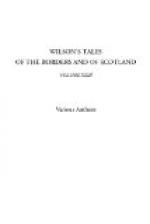This wonder also passed away, and, as time sped, old things began to get again into their natural order. Menelaws began to come again about the house; and as an old love, when the impediments are removed, is soon rekindled again, he and Annie became even all that which they had once been to each other. The old vows were repeated without the slightest reference being made by either party to the cause which had interfered to prevent them from having been fulfilled. It was not for Annie to proffer a reason, and it did not seem to be the wish of Menelaws to ask one. In a short time afterwards they were married.
The new-married couple, apparently happy in the enjoyment of an affection which had continued so long, and had survived the crossing of a new love, at least on one side, removed to a separate house farther up in the Lawnmarket. Menelaws had previously graduated as a doctor, and he commenced to practise as such, not without an amount of success. Meanwhile the councillor died, leaving Annie a considerable fortune. In the course of somewhere about ten years they had five children. They at length resolved on occupying the old house with the garden, for Annie’s reluctance became weakened by time. It was on the occasion of the flitting that Annie had to rummage an old trunk which Menelaws, long after the marriage, had brought from the house of his father, the dealer in pelts. There at the bottom, covered over by a piece of brown paper, she found—what? The very slipper which matched the one she still secretly retained in her possession. Verbum sapienti. You may now see where the strange land lies; nor was Annie blind. She concluded in an instant, and with a horror that thrilled through her whole body, that Menelaws had murdered his rival. She had lain for ten years in the arms of a murderer. She had borne to him five children. Nay, she loved him with all the force of an ardent temperament. The thought was terrible, and she recoiled from the very possibility of living with him a moment longer. She took the fatal memorial and secreted it along with its neighbour; and having a friend at a little distance from Edinburgh, she hurried thither, taking with her her children. Her father had left in her own power a sufficiency for her support, and she afterwards returned to town. All the requests of her husband for an explanation she resisted, and indeed they were not long persisted in, for Menelaws no doubt gauged the reason of her obduracy—a conclusion the more likely that he subsequently left Scotland. I have reason to believe that some of the existing Menelaws’ are descended from this strange union.




